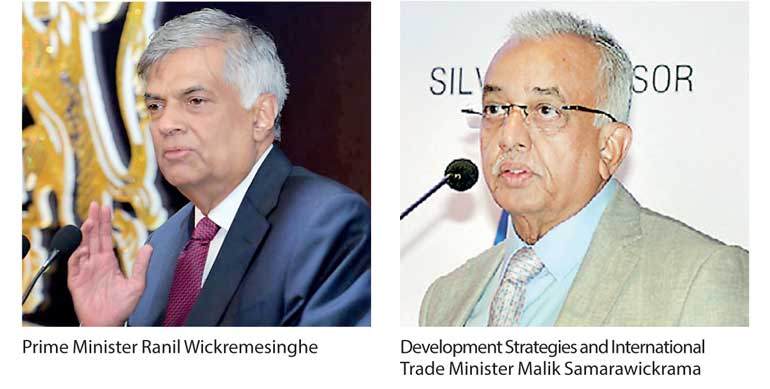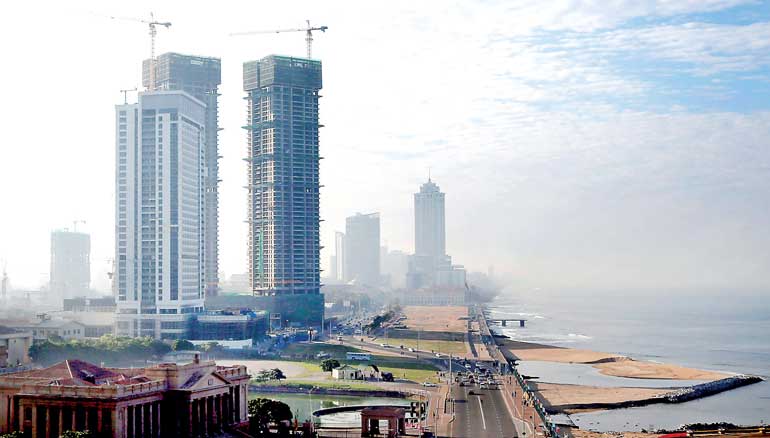Monday Feb 16, 2026
Monday Feb 16, 2026
Wednesday, 27 December 2017 00:00 - - {{hitsCtrl.values.hits}}

 A carefully focused/concentrated investment strategy, particularly for attracting Foreign Direct Investment (FDI) is needed by Sri Lanka as much time is wasted on less important programs, politics, and ways of robbing the tax payer.
A carefully focused/concentrated investment strategy, particularly for attracting Foreign Direct Investment (FDI) is needed by Sri Lanka as much time is wasted on less important programs, politics, and ways of robbing the tax payer.
One of the main reasons for this proposal is the massive external debt of $ 64 billion (2016) that has to be paid up by earning the required foreign exchange by investing to produce goods and services for export, since an adequate capacity for such production does not seem to be available, and of course by reducing unnecessary imports. The other reason is the urgency to create sufficient employment opportunities to reduce poverty and destitution, which has been estimated to be 32% of the population in 2012/13 by the World Bank.
However, investors, especially FDI which can bring in technologies, skills, and global market access besides capital, have been mostly avoiding SL due mainly to the ethnic conflict that gave rise to a 30-year war. Why is the FDI continuing to avoid the country even after the war ended in 2009? The reason is that although the war was won, the leaders of the country and the people have failed to remove the causes of the conflict. FDI, therefore, may fear history may repeat itself and clashes or even damaging war may break out again; such clashes really did occur even recently. So what has to be done?
Let us first examine the types of FDI that could be attracted: a) market seeking, b) natural resource seeking, c) efficiency seeking and d) strategic asset seeking. SL’s domestic market is too small to attract the first market seeking type. What has prevented the other types from entering the country? It is the negative investment climate that includes a strong security risk of investment, (OECD Country Risk Classification 2017, SL previously six and currently six, Afghanistan seven and seven); even prospective local investors may have been discouraged by it.
The ethnic conflict is not the only cause of the risk to investment in SL. The other causes are a) economic and political instability, b) the very poor quality of public institutions due mainly to politicisation, c) cumbersome rules and regulations relating to approvals/registration of projects, import of inputs, and exports of outputs (Ease of Doing Business Index , 2017, Sri Lanka 111, Singapore two and Malaysia 24 out of 189 countries, World Bank), d) the complexity of labour laws, e) the failure of the system of education to produce the technical/hard and soft skills required by businesses, f) inadequacies of physical infrastructure like frequent power outages and the traffic congested roadways, and g) the poor law and order situation. All of these have been made worse by the utter failure on the part of the leaders to make the people aware that poverty in the country is mainly due to the absence of adequate investments to create jobs and produce goods and services for export , since they have been busy with robbing the tax payer, (Corruption Perception Index 2016, SL rank 95 and Singapore seven out of 176 countries, Transparency International) and trying to gain short term political advantages especially by arousing tribal animosities.
A serious failure on the part of successive governments, including the current administration, has been the inability to reform the system of education to develop SL’s major resource base – human capital – by way of producing the hard and soft skills demanded by businesses; even though it is in the third year of assuming power, the Government is resorting instead to costly gimmicks like supplying computer tabs to school-going children. The curricula have still not been changed to teach the hard or technical skills imparted normally by the STEM subjects or science, technology, engineering and mathematics (not medicine as mentioned in the Budget 18 [B18]) and the soft skills; of the soft skills, 73% of SL businesses want training and experience, 63% want English and ability to communicate, 45% emphasise on team work and interpersonal skills, 42% demand IT skills, 21% want leadership and decision-making ability, and 21% demand problem-solving and analytical skills (Economic Intelligence Unit, British Council Report, 2015). In the absence of these hard and soft skills, investors, both FDI and local, may fear to start a business.

Now we can talk of ways and means of reducing the risks to investment, particularly FDI. The very first requirement is the acknowledgement by the leaders that SL is a conflict-affected country and that the reasons that gave rise to it should be removed as a first step; the leaders should then talk about it openly and also convince the people of the benefits that solutions to the problem, like a new Constitution (giving equal rights for all citizens irrespective of race or religion and granting devolution of powers to the regions), as well as measures to address the grievances felt by the minorities will bring, such as better employment opportunities created by the investment (it must be stated that a sign of success of such a program will be the appearance in the country of the Sri Lankan diaspora as investors ,professionals and skilled technicians ). It is, however, important to remember that such a good governance program is not a short term solution to the problem.
The leaders therefore must evolve short term measures that could improve the investment climate and reduce risk. These reforms include the simplification of cumbersome regulations, the relaxation of the complex labour laws, and reduction of corruption. If such measures also embrace improving the efficiency of and co-ordination among public institutions, protection of property rights and introduction of dispute settlement mechanisms etc., they would signal change to rule-based decisions and reduce the potential for corruption/politicisation; these would also improve transparency, predictability and lead to build up of confidence among investors.
One of the effects of too much regulation and corruption is described as ‘going under the radar’ in some literature or becoming informal; roughly 60% of firms in SL are supposed to have gone informal or not registered or approved; unfortunately these may therefore find it difficult to obtain assistance from the institutions concerned for their development e.g. for training of personnel, access credit, technology, markets, and so on. Even large formal firms are reported to be resorting to employing casual labour to avoid the complex labour laws. Reduction and simplification of regulations and laws may give the informal enterprises the confidence to become formal ; the state may benefit by way of tax revenue, the workers by better pay and stable employment, pension benefits etc., and the country by more jobs and goods and services.
Another short term measure is the extension of incentives such as those that were proposed in the B18 to local firms, as they have a higher tolerance of risk unlike the FDI. In this connection, it is the large scale local enterprises which should be enabled to take on the task of exports as their productivity and competitiveness could be higher; a special scheme has to be devised to incentivise them along with an investment promotion scheme to target selected FDIs; in parallel there should be a plan to reduce the high import tariffs/duties in a controlled manner so that firms will not try to seek protection and concentrate on the domestic market instead of the global market.
Still another short term solution is addressing the security problems and deficiencies of physical infrastructure by setting up special industrial/export zones closer to the capital of Colombo so that they can be supervised by security personnel. Skill shortages in such zones could be dealt with by vocational training schemes and temporary importation from nearby countries while connecting producers to markets. Another advantage of such zones is the possibility of exempting the taxes and duties on imported inputs for export production. The institution supervising the zones could also build the value chains of the enterprises occupying the zone to improve their productivity, i.e. reduction of unit costs and increasing the value of outputs; for example, if there is a firm producing a primary product in a zone, firms to produce secondary value added products and tertiary products and even services like marketing could be introduced to the zone and vice versa in the opposite direction, if only service firms operate in the zone; the institution managing the zone could also encourage the firms in the value chain to collaborate with each other to improve productivity further. The institution could also promote tie- ups with large foreign investors in selected product areas.
It must be mentioned such improvement of the investment climate alone is not sufficient to enable businesses to go global and earn foreign exchange. Policies to make them competitive are important. According to a recent press report, a shocking revelation is that SL has dropped from 71st in 2016/17 to 85th place in 2017/18 out of 140 countries in the Global Competitiveness Index of the World Economic Forum, Switzerland. Where policies for competitiveness with the rest of the world are concerned, an essential policy measure is the breaking down of the high import tariff/duty walls that we have erected around the country (to protect domestic firms from global competition), apart from the para tariffs that have been abolished by the B18. It is also quite necessary to improve the productivity of all factors of production such as land, labour, capital etc. (average growth of Total Factor Productivity of SL in 2010 to 2014: -1.48%, Conference Board Data Base), besides reducing the deficits in the government budgets, to decrease unit costs and raise outputs or improve the overall efficiency in the economy.
It has to be noted that investment for production of goods and services particularly for export could only bring about a trickledown effect that will take long years to reach the rural areas, where about 17 million people live, as stated in my book ‘Export Competitiveness and Poverty Alleviation in South Asia, with special reference to Sri Lanka’. The remedy recommended in the book is raising the productivity of factors of production, especially of land, by giving ownership of land to farmers for motivating owners of un-remunerative subsistence units to sell off to lead to an increase of the size of holdings as well as undertaking re-plotting to bring the normally scattered holdings closer together and construction of paved roads, to reduce the cost of using machinery.
Thus the main problem with the SL economy is the utter inadequacy of investments, particularly FDI, to produce jobs as well as goods and services. That is due to the high risk to investment which in turn can be attributed mainly to the conflict associated nature of the economy, the high level of cumbersome regulations made worse by corruption, poor law and order conditions, and the low quality of social and physical infrastructure. Therefore, there should be a well-focused strategy to overcome these constraints. Good governance as an item of this strategy could take long time to take effect. Therefore, short term strategies that include incentivising local investors, whose tolerance to risk could be high, have to be adopted. Even these could fail if the people are not made aware of the benefits of investment, such as job creation and poverty alleviation, as they would not in such circumstances oppose these strategies.